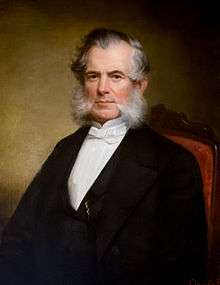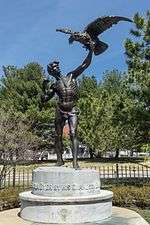Elisha Dyer
Elisha Dyer (July 20, 1811 – May 17, 1890) was an American politician and the 25th Governor of Rhode Island.
Elisha Dyer | |
|---|---|
 Official Rhode Island State House portrait by James Sullivan Lincoln | |
| 25th Governor of Rhode Island | |
| In office May 26, 1857 – May 31, 1859 | |
| Lieutenant Governor | Thomas G. Turner |
| Preceded by | William W. Hoppin |
| Succeeded by | Thomas G. Turner |
| Personal details | |
| Born | July 20, 1811 Newport, Rhode Island |
| Died | May 17, 1890 (aged 78) |
| Resting place | Swan Point Cemetery |
| Political party | Whig Republican |
| Spouse(s) | Anna Jones Hoppin |
| Children | Elisha Dyer, Jr. |
| Residence | Providence, Rhode Island |
| Alma mater | Brown University |
| Profession | Merchant |
Early life
Dyer was born in Providence, Rhode Island on July 20, 1811 to an old New England family which traced its Dyer ancestry back to William Dyer who came to Boston in 1635 from London.[1] Dyer's father was an extensive real estate owner also named Elisha Dyer (1772–1854), and his mother was Francis Dunn (née Jones) Dyer (1782–1873).[1]
Elisha Dyer entered Brown University at age fourteen, and graduated in 1829.[1] After completing his studies, he worked in his father’s mercantile business, Elisha Dyer and Co.
Career
During his life, he was variously associated with the Temperance Party, the Whig Party, and the Republican Party.[1] For example, he was a member of the Whig State Convention in 1851-1855.[1]
In 1840, Dyer was elected Adjutant General of Rhode Island. He held that position for five years. He then served on the Providence School Committee for over a decade.
From May 26, 1857 to May 31, 1859, Dyer served as the Republican governor of Rhode Island.
During the Civil War, Dyer was the captain of Company B of the 10th Rhode Island Volunteer Infantry. He served on active duty from May 23 to September 1, 1862 in the defenses of Washington, D.C.
Later life
He was appointed Rhode Island’s commissioner to the International Exhibition at London in 1871. He also was President and Director of the Exchange Bank and Second Vice President of the Rhode Island Art Association, and a member of the United States Agricultural Society. Dyer became a member of the Rhode Island Historical Society in 1837, and served on their board of trustees from 1845-1848.[1] He was a director of the Swan Point Cemetery in 1860. He was a member and director of the Providence Athenaeum.[1] He was also an active member of the Freemasons.
On March 5, 1884, Dyer was elected as a Veteran Companion of the Massachusetts Commandery of the Military Order of the Loyal Legion of the United States and was issued insignia number 3163.
In later life, Dyer became an invalid.[1] Still, he managed to travel extensively across the Atlantic, even visiting Egypt.[1] He also became a popular public speaker.[1]
Personal life
Dyer married Anna Jones Hoppin, daughter of Thomas C. Hoppin, at the Beneficent Congregational Church in Providence, on October 8, 1833.[1] Anna came from a political family; her grandfather was Governor William Jones and her cousin was Governor William W. Hoppin.[1] Elisha and Anna had seven children, including:
- Elisha Dyer, Jr. (1839–1906), who also became governor of Rhode Island, serving from 1897 to 1900.[1]
Dyer was a member of the Episcopal Church, and attended the Grace Church in Providence.[1]
He died on May 17, 1890 and is interred in Swan Point Cemetery in Providence, Rhode Island.[2]
Legacy

Industrialist Daniel Wanton Lyman commissioned a bronze statue "The Falconer" as a memorial to Dyer. The statue was designed by Henry Hudson Kitson and installed in Roger Williams Park in 1893.[3]
The Elisha Dyer Camp No. 7 of the Rhode Island Department of the Sons of Union Veterans of the Civil War is named in his and his son's honor.[4]
References
- Representative Men and Old Families of Rhode Island. 1. J.H. Beers & Company. 1908. pp. 2–4. Retrieved 22 April 2015.
- "Notable Persons Interred at Swan Point Cemetery". Swan Point Cemetery. Retrieved March 26, 2014.
- "Self-Guided Tour of Notable Art" (PDF). Roger Williams Park. The Roger Williams Park Consevancy. Archived from the original (PDF) on 20 August 2016. Retrieved 19 April 2017.
- "Elisha Dyer Camp No. 7". dyercamp7.org. Retrieved 8 June 2018.
Further reading
- Sobel, Robert and John Raimo. Biographical Directory of the Governors of the United States, 1789-1978. Greenwood Press, 1988. ISBN 0-313-28093-2
| Party political offices | ||
|---|---|---|
| Preceded by William W. Hoppin |
Republican nominee for Governor of Rhode Island 1857, 1858 |
Succeeded by Thomas G. Turner |
| Political offices | ||
| Preceded by William W. Hoppin |
Governor of Rhode Island 1857–1859 |
Succeeded by Thomas G. Turner |
